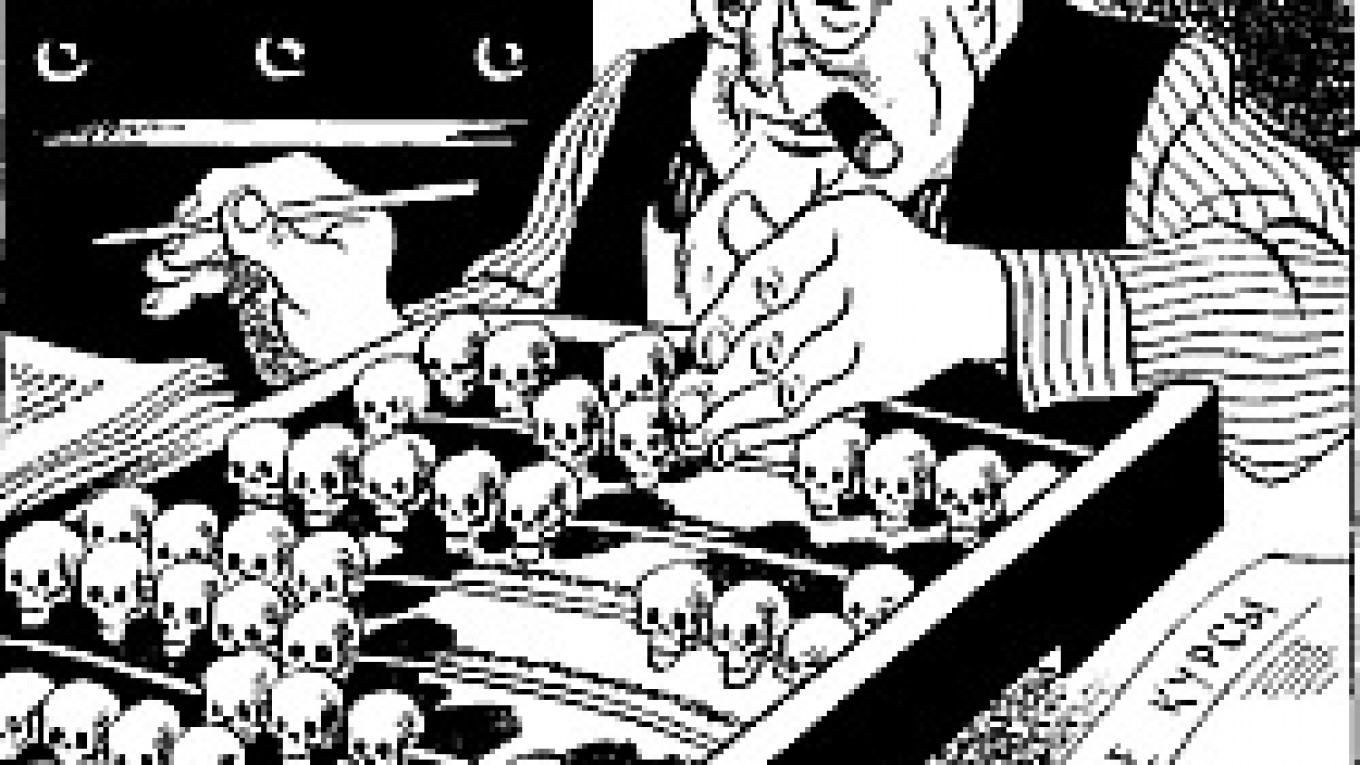A new exhibition of 246 of Yefimov's bitingly satirical cartoons for Izvestia, the army newspaper Krasnaya Zvezda and other publications has been unveiled at the Novy Manezh. Yefimov, who is 107, extremely hard of hearing and now draws only for his family, attended the opening. His pictures span the entire history of the Soviet state: The show begins with a drawing of Bolsheviks arresting a Tsarist general from 1918, one of Yefimov's first works, and ends with the artist's reflections on Mikhail Gorbachev's perestroika in 1987.
There are no cartoons from 1938 or 1939 -- after his brother's arrest, Yefimov was banned from publishing for a year. He then worked under a pseudonym for a time. "If he had refused to work, the authorities wouldn't have tolerated it. His wife and son would have been shot," Genrikh Borovik, a longtime friend of Yefimov and one of the curators of the exhibition, said in an interview Tuesday. Borovik added: "He worked sincerely -- he hated fascism. In my opinion, he believed in the idea of socialism."
Yefimov was born into a family of Kiev craftsmen in 1900, and had his first caricature -- a picture of the head of the State Duma -- published in weekly literary magazine The Sun of Russia in 1916. After the 1917 Revolution, he worked for a Bolshevik publishing department in Ukraine and then began contributing to national newspapers. He became one of the heavyweights of Soviet caricature, along with a trio that worked from 1929 named Kukryniksy, which stood for Mikhail Kupriyanov, Porfiry Krylov and Nikolai Sokolov.
Yefimov's pre-war cartoons focus on the two great evils in the Communist doctrine: fascists and capitalists. The Nazis are portrayed as filthy, slobbering animals, such as pigs and monkeys, while Westerners are often shown as money-grubbing monsters clad in dress coats and pinstriped trousers. A drawing from 1936 titled "The Rejuvenation of Germany" is reminiscent of one of Hieronymus Bosch's precise 15th-century depictions of hell: Yefimov drew animalistic Nazis dancing round a pyre of burning books, while a woman has been forced to wear a sign "I married a Jew," and her husband has a board that reads "I'm a pig, I disgraced an Aryan woman."
These drawings attracted the attention of the most powerful men in Europe. Hitler is said to have decreed that Yefimov be shot once the Nazis took Moscow. Stalin, meanwhile, supposedly decreed that Yefimov be spared following the detention of the artist's brother. Later, in 1947, Stalin called Yefimov to his office and demanded a cartoon about the United States' plans to build military bases in the Arctic region, which were described as purely defensive. Stalin's corrections to Yefimov's drawing, scrawled in red pencil, can be seen at the exhibition -- he added the ironic title "Eisenhower is 'Defending Himself.'"
During the Cold War, Yefimov's drawings vituperatively condemned NATO, the United States and Israel's Palestinian policies. "Explosive Provocations of Tel Aviv" from 1977 shows Israeli prime minister Menachem Begin dropping a flaming menorah into a barrel of gunpowder.
But as the Soviet Union declined, Yefimov had to adapt to a new reality. In his 1987 perestroika drawing, capitalist Americans are portrayed in a kinder light. "Perestroika is dangerous for the U.S.A.," one says. "We should welcome perestroika" admonishes another. Amazingly enough, this figure isn't a deformed mutant. He's dapper, young, even handsome.
"Lessons of History: The 20th Century in Cartoons" (Uroki Istorii: XX Vek v Karikaturakh) runs to Nov. 25 at Novy Manezh, located at 3 Georgiyevsky Pereulok. Metro Teatralnaya. Tel. 692-4459.
A Message from The Moscow Times:
Dear readers,
We are facing unprecedented challenges. Russia's Prosecutor General's Office has designated The Moscow Times as an "undesirable" organization, criminalizing our work and putting our staff at risk of prosecution. This follows our earlier unjust labeling as a "foreign agent."
These actions are direct attempts to silence independent journalism in Russia. The authorities claim our work "discredits the decisions of the Russian leadership." We see things differently: we strive to provide accurate, unbiased reporting on Russia.
We, the journalists of The Moscow Times, refuse to be silenced. But to continue our work, we need your help.
Your support, no matter how small, makes a world of difference. If you can, please support us monthly starting from just $2. It's quick to set up, and every contribution makes a significant impact.
By supporting The Moscow Times, you're defending open, independent journalism in the face of repression. Thank you for standing with us.
Remind me later.


